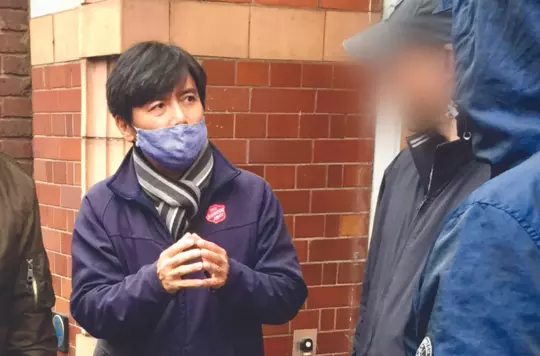14 June 2022
Alleviating loneliness and isolation in Harwich
George Tanton

George Tanton finds out how Harwich Wellbeing Lounge is caring for its community.
‘A lot of people we’ve supported feel very much on the margins of life,’ explains Lieutenant Victoria Moye.
She and her husband, Lieutenant Shawn, are corps officers at Harwich, where they assist in the running of a Renew Wellbeing Lounge. It is a refuge for people in the community who might be facing problems that include unemployment, social deprivation, housing issues and loneliness.
Based in the Esplanade Hall, an old school building in the town centre, the lounge is organised in partnership with Dovercourt Central Church and the Church of England’s Harwich Peninsula parish. It is part of a network of wellbeing lounges across the UK managed by a Christian organisation called Renew Wellbeing. Its mission is to establish centres where individuals on the fringes of communities, who feel they have become isolated from the wider world, can reconnect.
The lounge in Harwich was set up in November 2021 and attracts a regular number of visitors. It is open one day a week, with prayer sessions usually held three times in the day. People are encouraged to join in or use the time for quiet reflection away from the hustle and bustle of everyday life.

The idea for a wellbeing space came out of the interactions that Shawn and Victoria had during the Covid-19 pandemic.
‘We had about seven months here before the first lockdown started,’ says Shawn, ‘and we were identifying and meeting people who we knew had mental health crises or anxiety, which made their way of life challenging. But I think that has been exacerbated by the pandemic, because so many people were suddenly on their own or isolated.’
‘The people we support are known by name and valued for who they are and not because of the labels that are put on them,’ adds Victoria.
Addressing low levels of aspiration in a deprived seaside town
Once a thriving port, Harwich is a deprived area, with an inadequate network infrastructure that makes it hard for people to afford to travel to work.
‘Harwich dock now has only a small workforce. Places like this are not seeing the manual work they once did compared to 70 or 80 years ago and there are no other industries around,’ explains Shawn.
‘There is such a lack of opportunity for people that they’re almost stuck in a place they can’t get out of. There are people who are effectively stuck in the town because they don’t have the money to travel, or because the work they can find is so low paid that it doesn’t cover the costs of travel. So they become very reliant on benefits.
‘Some people who receive universal credit in the town live in accommodation that is not looked after by their landlords. We’ve supported one woman who’s not had an operating kitchen for a year.’
Shawn says that education is therefore seen by some in the area as futile, with the perception that ‘there’s no point going to school because there’s nothing for you afterwards’.
‘We are seeing different generations come through the doors having this same low level of aspiration,’ continues Victoria.
Responding to increased loneliness, isolation and anxiety
The Covid-19 pandemic undoubtedly exacerbated existing strains on the community, she adds: ‘Some young mums we have contact with have just had babies and are nervous to go out. This should be a happy time for them but, post-pandemic, this is not the case.

‘Some of the mums we have contact with are carrying a lot of mental baggage that has built up over the years and is preventing them from engaging with other things.’
The lounge aims to alleviate social isolation and loneliness by being a focal point for the community. Its outside space helps provide this. In the winter they have a fire pit and in the summer months they have a gazebo with chairs so that people can sit outside more comfortably. There is also a dog bowl with treats and water so that regular dog-walkers can make it a stop on their walks and have a chat.
‘It welcomes people to the space,’ says Victoria. ‘They then gravitate inside and see what’s going on.’
As an open forum, where people can visit for a cup of tea and talk to others, the lounge provides some release from loneliness. As well as books spanning faith, fiction and non-fiction, activities on offer include organised crafts. They recently made and painted clay hearts, which were then hung around the local community as a random act of kindness.

‘One of our ladies is in her 80s,’ says Victoria. ‘The first week she came, she just observed. The next week she sat next to someone and taught them how to play Mahjong. This past week she had nearly the whole table playing it.
‘People come in alone and take a week or two or three to engage, depending on how confident they feel. They then progress to teaching others. Another lady who was really struggling came in and everyone offered help. There was a real sense of camaraderie as none of us here professes to being 100 per cent OK.’
Prioritising relationships over fixing problems
The hub is not about fixing people’s problems but about ‘being present and prayerful’, explains Victoria.
‘We’re saying to people, “We know this is coming up, or we know this situation’s tricky, we will be praying for you.” It’s also recognising that the lounge is not a standalone thing.
‘We connect and interact with many of the people who come to the lounge throughout the week, so there are ongoing conversations happening. The beauty of that is that it is a partnership between the three main churches in this area, so we have even more scope to be present in people’s lives at other times of the week.’
‘We’re using our love of God to love others. That’s what it’s about,’ affirms Shawn. ‘We have provided this space because we love God and we love others.’
Written by

George Tanton
Editorial Assistant
Discover more

These resources are a great way to introduce your corps to members of your community as well as share info about The Salvation Army nationally.

Major Andrew Vertigan unpacks what pioneering really means with Simon Hope.

Lieutenant Wan Gi Lee considers the challenge of church growth.

Jo Taylor reminds us why connecting with children and young people is vital.